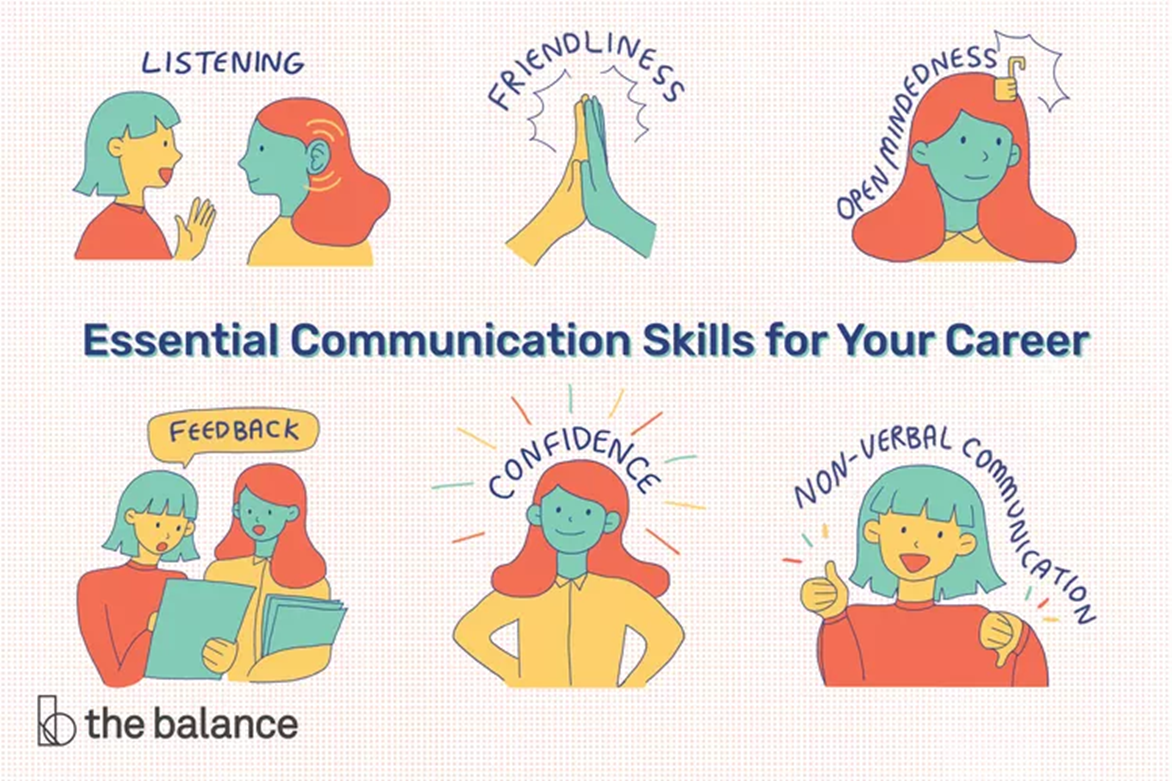Have you ever wondered why some people effortlessly glide through social situations, making connections and leaving a positive impact, while others struggle to navigate the intricacies of human interaction?
The secret sauce lies in their interpersonal skills—the unsung heroes that can make or break personal and professional relationships.
Table of contents
What are Interpersonal Skills?

In simple terms, interpersonal skills are the tools you use to communicate, collaborate, and connect with others. Think of them as the social currency that helps you navigate the complex web of human relationships.
Whether you’re a seasoned professional or just starting your career journey, honing these skills can be a game-changer.
Why Are Interpersonal Skills Important?

Let’s dive into a real-life scenario to highlight the significance of interpersonal skills. Imagine two colleagues, Alex and Taylor, competing for a promotion. Both possess the technical know-how required for the job, but Alex’s ability to communicate effectively, empathize with team members, and resolve conflicts sets them apart. Who do you think is more likely to land the coveted role?
In today’s interconnected and fast-paced world, employers are not only looking for individuals with stellar technical skills but also those who can thrive in collaborative environments.
Your interpersonal skills act as a magnetic force, attracting opportunities and fostering a positive work culture.
4 Most Important Interpersonal Skills Are?

Communication Skills:
The cornerstone of interpersonal prowess. Being able to convey your thoughts clearly and listen actively is crucial. Consider this: when you can articulate your ideas persuasively, you become a driving force in meetings and negotiations.
Emotional Intelligence:
Developing an awareness of your own emotions and effectively regulating them, along with the ability to empathize with others, is a key characteristic of emotional intelligence.
It’s the compass that guides you through the tricky waters of workplace dynamics, helping you build meaningful connections.
Problem Solving:
Every workplace encounters challenges. Those with strong problem-solving skills don’t just see obstacles—they see opportunities.
Imagine being the person who not only identifies issues but also presents creative solutions. That’s the mark of an interpersonal maestro.
Adaptability:
The ability to navigate change with grace. In today’s dynamic job market, adaptability is non-negotiable.
Those who can pivot seamlessly and collaborate with diverse teams are the ones who excel.
Interpersonal Skills in the Workplace:

Consider this: You’re working on a high-stakes project with a tight deadline. Your ability to communicate effectively ensures everyone is on the same page, emotional intelligence helps manage stress, problem-solving skills allow you to tackle unexpected obstacles, and adaptability ensures you can roll with the punches.
From entry-level positions to leadership roles, interpersonal skills are the glue that holds teams together. In meetings, negotiations, and daily interactions, those who master these skills become invaluable assets to their organizations.
Jobs That Require Interpersonal Skills:
1. Sales and Customer Service: Real Estate Agent:
As a real estate agent, your ability to build trust and establish rapport is paramount. From understanding your clients’ dream home visions to negotiating deals, your interpersonal skills are the driving force behind a successful real estate career.
For Example: Picture a potential buyer uncertain about making a significant investment. Your knack for active listening, empathy, and effective communication helps you understand their needs and guide them through the process. This not only secures a deal but also leads to satisfied clients who may refer others to your services.
2. Human Resources Specialist
In the realm of HR, interpersonal skills are at the core of the job. Handling employee relations, conducting interviews, and resolving conflicts require a delicate touch and the ability to connect with individuals at various levels within the organization.
Example: Imagine you’re in HR, mediating a conflict between two team members. Your empathetic approach and strong communication skills help bridge the gap, fostering a healthier work environment. This not only resolves the immediate issue but contributes to a positive workplace culture.
3. Leadership and Management Roles
Whether you’re leading a small team or managing projects, strong interpersonal skills are indispensable. Leaders who can effectively communicate, inspire, and collaborate tend to create high-performing and engaged teams.
For example: Picture yourself as a project manager working on a tight deadline. Your ability to motivate and communicate clearly with your team ensures everyone is on the same page. The project not only meets its deadline but also strengthens team cohesion.
4. Teaching and Training Professionals
In the field of education, interpersonal skills are crucial for effective teaching and training. Educators who can connect with their students, understand their individual needs, and communicate concepts clearly often make a lasting impact.
Storytime: Imagine you’re a teacher introducing a complex concept. Your ability to gauge students’ understanding levels, adapt your teaching style, and provide additional support to those who need it showcases your exceptional interpersonal skills. This not only enriches the educational environment but also nurtures a positive atmosphere within the classroom.
5. Healthcare Professionals: Nurses and Doctors
In the healthcare sector, building trust with patients is essential. Nurses and doctors with strong interpersonal skills can ease anxieties, communicate medical information effectively, and provide empathetic care.
Lets say: Picture a patient receiving difficult news about their health. Your ability as a healthcare professional to convey information with empathy, listen to the patient’s concerns, and involve them in decision-making contributes not only to their physical well-being but also to their overall experience with healthcare.
6. Public Relations Specialist
In the world of PR, creating and maintaining positive relationships with clients, media, and the public is the crux of the job. Interpersonal skills play a pivotal role in shaping public perception and managing crises.
Example: Consider a PR specialist handling a crisis situation for a client. Your ability to communicate transparently, address concerns, and maintain a positive public image showcases your adept interpersonal skills, safeguarding the client’s reputation.
How to Improve Your Interpersonal Skills?

The good news is that interpersonal skills can be developed and refined over time. Here are some practical tips to enhance your interpersonal prowess:
Active Listening:
Practice truly hearing what others are saying. It’s not just about waiting for your turn to speak but understanding the nuances of their message.
Seek Feedback:
Constructive criticism is a powerful tool for growth. Seek feedback from both colleagues and superiors to pinpoint areas where you can enhance your performance.
Empathy Building:
Put yourself in others’ shoes. Understanding their perspective fosters a culture of respect and collaboration.
Conflict Resolution Workshops:
Equip yourself with strategies to navigate conflicts diplomatically. Turning a potential crisis into a learning opportunity showcases your problem-solving skills.
Continuous Learning:
Stay updated on industry trends and interpersonal skill best practices. Attend workshops, webinars, and conferences to broaden your knowledge base.
Intrapersonal Skills: Understanding Yourself:

In the grand symphony of interpersonal skills, there’s an often-overlooked soloist: intrapersonal skills. It’s like the prelude to a musical masterpiece, setting the stage for harmonious connections with others.
Intrapersonal skills delve into the realm of self-awareness, self-regulation, and self-motivation, forming the foundation upon which robust interpersonal skills are built.
1. Self-Awareness: Tuning into Your Inner Melody
Imagine a pianist about to perform on stage. Before the first note is played, there’s a moment of introspection—a connection with the instrument and an awareness of the upcoming performance.
Similarly, self-awareness is the conscious recognition of your own thoughts, emotions, and motivations.
Consider a professional navigating a challenging project. By being self-aware, they recognize their strengths in problem-solving but also acknowledge areas that may need improvement. This awareness becomes a compass, guiding their actions and decisions.
2. Self-Regulation: Orchestrating Your Emotional Responses
In the intricate dance of professional and personal life, emotions often take center stage. Self-regulation, however, is the skill of being the choreographer of your emotional responses.
It’s about managing stress, staying calm under pressure, and steering your emotions in a constructive direction.
Picture a team leader facing unexpected setbacks. By practicing self-regulation, they maintain composure, address challenges methodically, and provide a stabilizing influence for the team. This not only fosters a positive work environment but also sets an example for effective leadership.
3. Self-Motivation: Fueling Your Inner Fire
Just as a flame requires fuel to burn brightly, your professional journey thrives on self-motivation.
Intrapersonal skills encompass the ability to stay driven, set goals, and navigate setbacks with resilience. It’s the force that propels you forward, even when faced with challenges.
Envision an individual pursuing a career change. By tapping into their self-motivation, they set clear objectives, persist through the job search, and continue learning and growing. This internal drive not only propels them toward success but also radiates enthusiasm to those around them.
Conclusion:

In a world driven by technology, don’t underestimate the power of human connection. Your interpersonal skills are not just words on a resume; they are the secret sauce that propels you toward success.
So, as you embark on your journey to strengthen your interpersonal skills, remember this: it’s not just about what you know but how you relate to others. In the grand tapestry of your career, interpersonal skills are the vibrant threads that weave success.
Now, armed with this knowledge, go out there and not just secure a job but build a fulfilling career—one where your interpersonal skills shine as brightly as your technical expertise. You’ve got this!
Are you driven to succeed and improve your skills? Choose IQI for endless possibilities and create your own success. Grab the opportunity TODAY!
